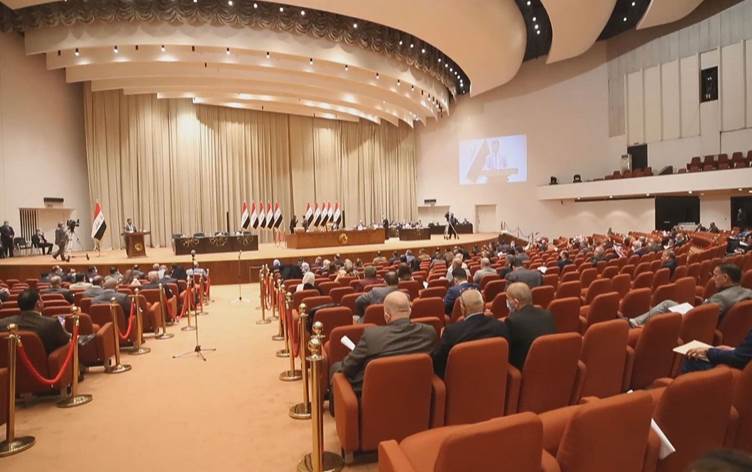After Muqtada al-Sadr’s one-month deadline bore no fruit, the Shiite Coordination Framework and Sadr, who leads the parliament’s largest bloc with 74 seats, put forth different suggestions to put an end to the political deadlock. However, none of the initiatives has helped end the impasse yet.
The tripartite alliance and the Coordination Framework have understood it is difficult for any bloc to be able to form the next government without the involvement of the other. Therefore, they threw the ball to the courtyard of the so-called independent MPs to give it a try. The decision to give an opportunity to the independent MPs was made after Iraq’s federal Supreme Court decided a two-thirds of MPs must be present in order for a quorum to be met is required to elect the president. The tripartite alliance has ramped up efforts for months now to end the gridlock and mobilize as many as 220 MPs, yet to no avail.
Despite classifying the identity and affiliation of the “independents,” the responsibilities given to new and inexperienced parliament members by the coordination framework and al-Sadr are beyond the abilities of the new parliament members. Also, giving responsibilities to the independent parliament members makes the political game more complex and it is about requesting difficult conditions that they cannot observe.
The coordination framework, for example, announces conditions to the “independent” members to defend the rights of the Shiites. On the other side, al-Sadr also asks the “independent” members to establish a faction consisting of 40 members in the parliament and avoid cooperation with the coordination framework. However, the “independent” members are biased toward various political groups, and they have never held an internal meeting in the last six months.
Since neither the Kurds nor the Sunni parties have “independent” members, they must be divided among the Shiite parties based on the influence of geography, weapons, and population of the leading Shiite parties. Moreover, the “independent” members are biased or independent locals that are divided among the two major polar of Shiites.
When the winners, armed forces, and armed organizations cannot form the government, giving the responsibilities to the weak “independent” members is a way to bypass the actual solution because some of the “independent” members don’t have a nationalistic view and a comprehensive discourse. Also, they are elected just to represent vulnerable groups, people’s needs, and local concerns. Therefore, if the issue isn’t about extending the above-mentioned political formula that has been in place for the last six months, then it is about taking advantage of a better opportunity for the players in the political field.
An initiative in traditional politics must include a new solution or contain the possibility of success and implementation. Al-Sadr and the coordination framework’s initiatives are similar to their previous discourses.
It is, however, a new attempt to advertise their previous discourses via a new cover and title. Furthermore, the two parties’ initiatives add nothing new, but the initiatives are an extension of Shiites’ internal problems and insist on electing a Shiite prime minister. Thus, implementing the initiatives will not be better than Adil Abdul-Mahdi’s cabinet and Haider al-Abadi and his “technocratic ministers,” that were a puppet in the times of sectarian war.
Deepening the political impasse because of the non-implementation of opposing initiatives will result in a number of greater factors that cannot be hidden in such a game. The October 10, 2021 election results were unbalanced between the size and number of the parliament seats obtained by the armed forces and the religious, social, and financial influences. In addition, the great polarity of negotiating was unbalanced in the past. For instance, in the past, Ali al-Sistani and his followers encouraged cooperation among the factions. In recent times, the Najaf Marja’iyya didn’t get involved in the current political situation. Also, the Americans are concerned about the war in Ukraine, and in Biden’s era, they are worried about their domestic issues. Also, Brett McGurk’s continuous presence in Iraq has ended. Furthermore, the Iranians cannot impose their conditions on forming an Iraqi government capable of distributing power and goods among the parties regardless of the election results. However, the Iranians were successful in stopping the political game in order to protect their security needs and its role in Iraq’s political arena, particularly at this time when Iran lacks a clear vision regarding the Vienna talks.
In times of political impasse, the political paths may lead to Mustafa Al-Kadhimi being re-elected as a prime minister in the new cabinet with some terms and conditions or keeping him in the current position until they consider a new solution, for instance, Iraqi parliamentary re-election in the next two years. Due to this, Kadhimi is politically active in the field. He mentions “I’m available” as a tested prime minister in which I saved you from the coronavirus pandemic and the financial crisis. Also, he states that now I’m caring for all of you.



